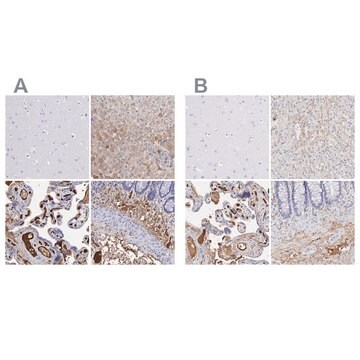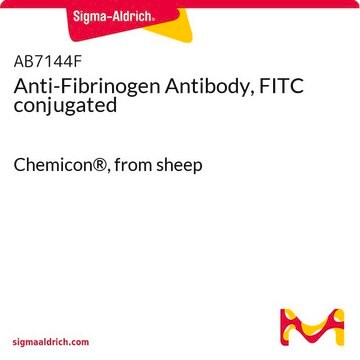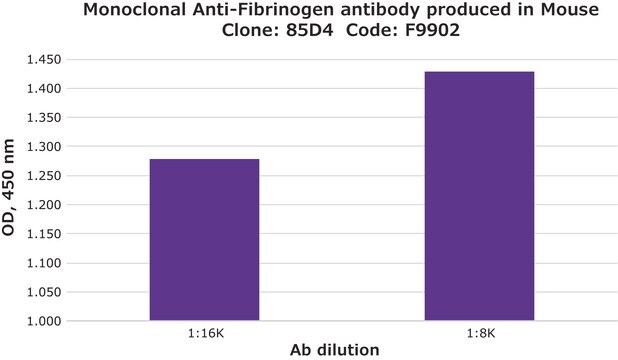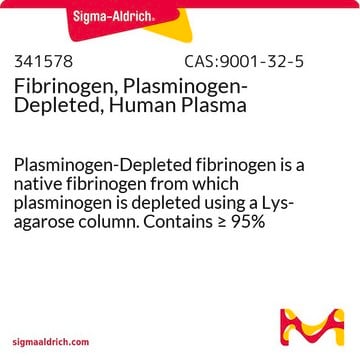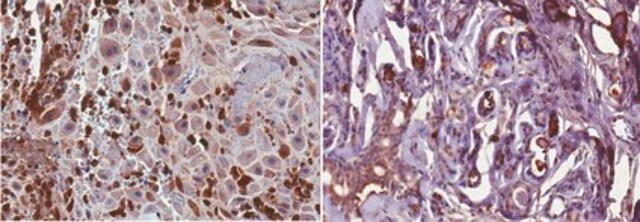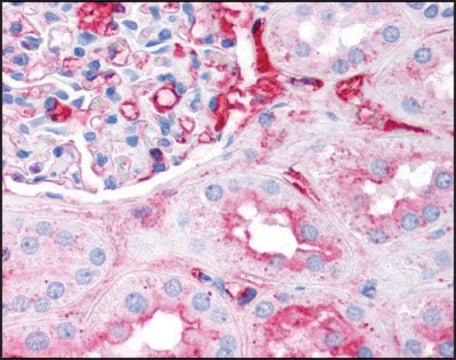MABS2155
Anti-Fibrin Antibody
clone 59D8
Synonym(s):
Fibrinogen beta chain
Sign Into View Organizational & Contract Pricing
All Photos(3)
About This Item
UNSPSC Code:
12352203
eCl@ss:
32160702
NACRES:
NA.41
Recommended Products
biological source
mouse
clone
monoclonal
species reactivity
mouse, human
technique(s)
immunofluorescence: suitable
immunohistochemistry: suitable
inhibition assay: suitable (peptide)
radioimmunoassay: suitable
western blot: suitable
General description
Fibrinogen beta chain (UniProt: P02675) is encoded by the FGB gene (Gene ID: 2244) in human. Fibrinogen beta chain is synthesized with a signal peptide (aa 1-30), which is subsequently cleaved off to product the mature protein that is further cleaved by thrombin to produce fibrinopeptide B (aa 31-44) and fibrinogen beta chain (45-491). Conversion of fibrinogen to fibrin is triggered by thrombin, which cleaves fibrinopeptides A and B from alpha and beta chains, and thus exposes the N-terminal polymerization sites responsible for the formation of the soft clot. The soft clot is converted into the hard clot by factor XIIIA which catalyzes the epsilon-(gamma-glutamyl)lysine cross-linking between gamma chains (stronger) and between alpha chains (weaker) of different monomers. Fibrin monomers spontaneously aggregate into an insoluble gel, which is then covalently stabilized by Factor XIIIa. Fibrin is shown to retain about 98% of the original covalent structure of fibrinogen. Fibrin clot can be broken down by plasmin by cleave between residues 152-153 and 163-164. This monoclonal antibody (clone 59D8) binds to fibrin even in the presence of human fibrinogen at the concentration found in plasma. (Ref.: Hui, KY., et al. (1983). Science. 222 (4628); 1129-1132).
Immunogen
KLH-conjugated synthetic heptapeptide (GHRPLDK) derived from the N-terminal region of the beta chain of human fibrinogen.
Application
Anti-Fibrin, clone 59D8, Cat. No. MABS2155, is a mouse monoclonal antibody that detects fibrin and has been tested for use in Immunofluorescence, Immunohistochemistry, Peptide Inhibition Assay, Radioimmunoassay, and Western Blotting.
Western Blotting Analysis: 1 ug/mL from a representative lot detected Fibrin in human liver tissue lysates.
Immunofluorescence Analysis: A representative lot detected Fibrin in Immunofluorescence applicaitons (Thalji, N.K., et. al. (2016). Nat Me
Immunofluorescence Analysis: A representative lot detected Fibrin in Immunofluorescence applicaitons (Thalji, N.K., et. al. (2016). Nat Me
Quality
Evaluated by Western Blotting in mouse liver tissue lysate.
Western Blotting Analysis: 1 ug/mL of this antibody detected Fibrin in mouse liver tissue lysates.
Western Blotting Analysis: 1 ug/mL of this antibody detected Fibrin in mouse liver tissue lysates.
Other Notes
Unless otherwise stated in our catalog or other company documentation accompanying the product(s), our products are intended for research use only and are not to be used for any other purpose, which includes but is not limited to, unauthorized commercial
Certificates of Analysis (COA)
Search for Certificates of Analysis (COA) by entering the products Lot/Batch Number. Lot and Batch Numbers can be found on a product’s label following the words ‘Lot’ or ‘Batch’.
Already Own This Product?
Find documentation for the products that you have recently purchased in the Document Library.
Our team of scientists has experience in all areas of research including Life Science, Material Science, Chemical Synthesis, Chromatography, Analytical and many others.
Contact Technical Service
